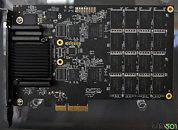- Joined
- Oct 9, 2007
- Messages
- 47,418 (7.51/day)
- Location
- Hyderabad, India
| System Name | RBMK-1000 |
|---|---|
| Processor | AMD Ryzen 7 5700G |
| Motherboard | ASUS ROG Strix B450-E Gaming |
| Cooling | DeepCool Gammax L240 V2 |
| Memory | 2x 8GB G.Skill Sniper X |
| Video Card(s) | Palit GeForce RTX 2080 SUPER GameRock |
| Storage | Western Digital Black NVMe 512GB |
| Display(s) | BenQ 1440p 60 Hz 27-inch |
| Case | Corsair Carbide 100R |
| Audio Device(s) | ASUS SupremeFX S1220A |
| Power Supply | Cooler Master MWE Gold 650W |
| Mouse | ASUS ROG Strix Impact |
| Keyboard | Gamdias Hermes E2 |
| Software | Windows 11 Pro |
What's better than an OCZ Vector SSD? Two of them in RAID 0, on a PCIe add-on card. The SSD may use two SSD subunits in RAID, yet it's backed by OCZ's VCA 2.0 (virtualized controller architecture), which lends it TRIM support, even in high-performance RAID 0 modes. At CeBIT, the company ran live benchmarks of the drive. These include tests that are generally lenient on the drives (sequential tests), yet the results are impressive.
To begin with, the Vector PCIe 960 GB belts out up to 929.96 MB/s sequential read speeds, 883.94 MB/s sequential writes; and a comfortable 4K 64-thread read performance of 544.71 MB/s, 486.19 MB/s writes. It scrapes the 1000 MB/s mark in ATTO. In synthetic tests that replicate real-world scenarios, such as ISO file copy, program access, and game resource access, the drive managed to stay above 396 MB/s. The drive has advertised read/write speeds of 1000 MB/s, and random access performance as high as 140,000 IOPS.


View at TechPowerUp Main Site
To begin with, the Vector PCIe 960 GB belts out up to 929.96 MB/s sequential read speeds, 883.94 MB/s sequential writes; and a comfortable 4K 64-thread read performance of 544.71 MB/s, 486.19 MB/s writes. It scrapes the 1000 MB/s mark in ATTO. In synthetic tests that replicate real-world scenarios, such as ISO file copy, program access, and game resource access, the drive managed to stay above 396 MB/s. The drive has advertised read/write speeds of 1000 MB/s, and random access performance as high as 140,000 IOPS.


View at TechPowerUp Main Site







 OCZ .
OCZ .